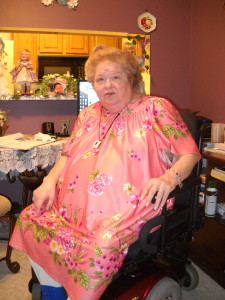Left behind: Botched Nebraska ride program strands the disabled

By Deena Winter | Nebraska Watchdog
LINCOLN, Neb. – A new broker hired by the state of Nebraska to coordinate rides for Medicaid recipients to doctor appointments has left disabled people waiting at doctor’s offices for hours as its phone lines jammed with callers trying to schedule rides.
STRANDED: Ruth Firley says she couldn’t get through on phone lines to schedule rides on a state program for two weeks, then was left stranded at doctor offices.
IntelliRide won a three-year contract to coordinate a projected 500,000 non-emergency trips annually to 125,000 Medicaid recipients and oversee a call center and dispatch services. IntelliRide took the wheel on May 1, but clearly wasn’t road ready.
Ruth Firley, a 68-year-old Lincoln woman who has diabetes and spinal problems and uses a wheelchair, says she was unable to get through to schedule rides for almost two weeks. When she finally got through, she was put on hold for about 7 minutes.
Her troubles didn’t end there. Though she was able to schedule rides, nobody showed up for one appointment, the driver arrived a day early for another ride, she was taken to the wrong address once and was left at the Nebraska Heart Institute without a ride home. She says she knows other people who’ve been left at the wrong address and abandoned at doctor’s offices. An Omaha man missed several dialysis appointments. Some doctors have given patients rides home, she said.
“IntelliRide was not equipped to handle the contract,” she said. “It’s beyond a mess.”
Firley says she never waited for more than a half hour when trips were handled by the previous transportation broker, AMR.
“I never feared riding with them,” she said. “They took the safety of their clients to heart – a whole different atmosphere than what we’re getting now.”
She also suspects the drivers are taking more circuitous routes to make more money; when she has questioned the long drives, drivers have told her once they hit the eight-mile mark, they’re paid a flat rate of $45.
Kathie Osterman, spokeswoman for the state Department of Health and Human Services, said by the end of May, 21,291 rides had been given and 81 percent were completed on time. The average hold time for calls was 6 minutes, 22 seconds.
As of July 2, 99 percent of clients were picked up within an hour of the requested time and 83 percent were dropped off at or before the requested time.
“IntelliRide continues to work with transportation providers to improve on this,” she said. “Whenever a complaint is received it is reviewed and there is a followup.”
Kirby Young, president of Servant Cab, one of 1,300 transportation providers, said since IntelliRide took over as the broker, he doesn’t get half as many calls for rides.
“What’s going on with the Intelliride system is a major problem,” he said.
IntelliRide’s call center was understaffed and didn’t have enough phone lines to handle the crush of clients, he said.
“I answer calls every day, all day long, from people who are frustrated,” Young said. IntelliRide is “still trying to dig out.”
IntelliRide has changed the system by having providers pick up several patients headed in the same direction, he said, which will be more efficient in the long run. But it takes some getting used to.
“People are used to being taken from A to B,” he said.
For Firley, it’s literally a pain in the spine. On June 11, a long, bumpy trip sent both her and her caretaker to the emergency room, they said.
“I can’t be transported all over town,” she said.
With AMR, clients had to call three days in advance, Young said, but IntelliRide is more computerized and eventually clients will be able to schedule same-day trips.
“Once it’s working right… it will get a lot better,” he said.
IntelliRide did not respond to a request for comment, but has said it hired additional employees and temporarily expanded its call center hours to try to meet demand.
Osterman said the average hold time for callers is down to 3 minutes, 17 seconds as of July 2, but Firley said she always waits longer than that.
She’s been emailing the governor’s office and calling reporters to try to advocate for others who’ve been left on curbsides with no way to get home.
“I have a lot wrong with me; I’m probably not long for this Earth, but I just feel that somebody needs to be a spokesperson,” she said. “We aren’t welfare babies, we are Medicaid recipients.”
Follow Deena on Twitter at @DeenaNEWatchdog
Editor’s note: to subscribe to News Updates from Nebraska Watchdog at no cost, click here.







